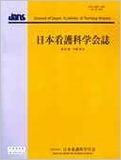Japanese
English
- 販売していません
- Abstract 文献概要
- 参考文献 Reference
- サイト内被引用 Cited by
要旨
目的:緩和ケア病棟(以下,PCU)という場において退院支援を行うことが,看護師にとってどのような意味を持つかを明らかにすることを目的とした.
方法:エスノグラフィを用いて,都内にある1病院のPCUに勤務する看護師を中心に,参加観察及びインタビューを実施し,Spradleyの段階的研究手順法を参考にして分析した.
結果:『その人らしさを追求し,患者・家族と共に家を目指すチャレンジ』というテーマが生成された.退院支援は看護師にとって,患者と家族の穏やかな時間を脅かすリスクを伴いながらも,その人らしく生きることを支えるために家を目指すチャレンジだった.看護師は,自宅退院を選択する際や,退院に向けて準備する際も常に退院支援に伴う葛藤を抱えながら,PCUに戻れることを保証して家へ送り出していた
結論:退院支援というチャレンジに伴う葛藤に対処することにより,PCUにおける退院支援が促進される可能性がある.
Objectives: The purpose of this study was to reveal the meaning of discharge planning for nurses working in a Palliative Care Unit (PCU).
Methods: Using an ethnographic design, data collection included participant observation, field notes, and semi-structured interviews with PCU nurses in an urban hospital in Japan. Spradley's Developmental Research Sequence method was used for data analysis.
Results: The following was the general theme: “Discharge planning presented a challenge for nurses as they supported the patient's and family's transition to home and facilitated the patient's return to his/her genuine self.” Discharge planning was a challenge for nurses because they had to try to help the patient's transition to home and support the patient to be his/her genuine self despite the risk that the transition may disturb the patient's and the family's well-being. Additionally, the nurses faced a dilemma, along with discharge planning, when the patient chose to be discharged and while preparing for discharge. Therefore, nurses saw off the patient to his/her home with a guarantee that he/she would come back to the PCU.
Conclusion: Discharge planning from the PCU presented a challenge for nurses. This study suggests ways nurses experience and should help improve the discharge planning process in the future.
Copyright © 2017, Japan Academy of Nursing Science. All rights reserved.


